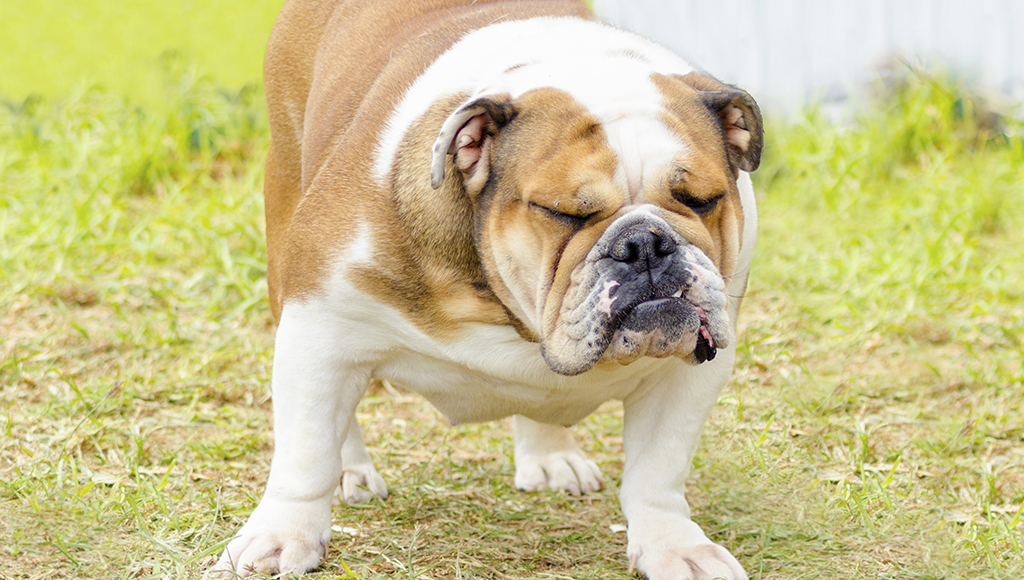Constipation in Dogs: Causes and Prevention
If left untreated this condition can lead to much more serious health problems.

Just like humans, dogs can become constipated. It may seem like a relatively mild condition, but if left untreated, constipation in dogs can lead to much more serious health problems. Veterinarians have been researching remedies for canine constipation for several years, and have made some useful advances in treating this condition. There are many identified causes of constipation in dogs, most of which are able to be treated by better lifestyle habits and attentive health care.
How to Identify Constipation in Your Dog
Constipation is a condition that can be defined by a visible difficulty in your dog's bowel movements. If you have a dog that lives primarily indoors, and requires supervised bathroom visits outside, you will be able to identify this condition almost immediately after its onset. If you have a dog that spends a lot of time outdoors, you may not recognize this condition for quite some time since you will not be with him every moment. As a responsible dog owner, it is your duty to a keep constant watch over your dog’s health and well-being. Be sure to pay attention to any changes in your dog’s attitude or behavior, as these may be symptoms of existing health problems.
A constipated dog will be very uncomfortable, and will most likely let you know. Early signs are very important for discovering if your dog is suffering from constipation. Most dogs are intelligent enough to give their owners some visible clues that something is wrong.
Possible signs of
constipation in your dog may include:
- Straining while going to the bathroom, and staying
in the “pooping position” (both back legs are bent, with the
rear close to the ground) for a significant amount of time
- Excessive whining and shuffling in circles
- Not be able to make normal bowel movements,
and may even excrete a watery substance that can be mistaken for
diarrhea
- Difficulty walking
- Refusal of food
- Hemorrhoids: painful, swollen
veins in your dog's rectal area that can make treatment of this
condition much more difficult
Diet and Constipation in Dogs
Constipation is usually 100% preventable. Many of the known causes of constipation are due to an inadequate dietary intake of liquids, poor or low fiber diets, or dysfunctional digestive enzymes. The primary cause of constipation is excessive water absorption by the large intestine that is recycled into the bloodstream. However, this does not necessarily mean that drinking excess water will prevent constipation in your dog. This is a very common misconception, as many people think that constipation is directly related to low water intake.
Most dogs will have normal bowel movements when adequately hydrated, and drinking too much water will not make any difference. Although dehydration can lead to constipation, the best preventive measure is to feed your dog high-quality dog food. Over-processed dog foods are difficult to digest, and can be very hard on your dog's digestive system. A high-nutrient, high-fiber diet, combined with a regular exercise routine, is the best way to ensure that your dog remains constipation-free.
DO NOT feed your dog commercial laxatives! Human medicine is not designed to be used on pets, unless specifically directed to do so by a veterinarian. Doing so may result in much more serious problems for your pet. Constipation is a health problem that can be easily prevented, and there are many treatment options available for dogs with this condition.
Primary Causes Of Constipation in Dogs
1. Dehydration
Dehydration is the cause that is most commonly associated with constipation. When your dog is dehydrated, the colon absorbs more fluid from the waste being passed through the intestines. This results in dry, hard stools, and can greatly contribute to constipation in your dog. However, constipation can only be treated with an increase in drinking water if the condition is specifically caused by an inadequate supply of fresh drinking water. If there are other contributing causes to your dog’s constipation, simply increasing water intake will not cure your dog's condition; this is a very common misconception.
2. Indigestible Objects
Dogs are very active, and most dogs love to play. However, many rambunctious dogs chew on objects that are not meant for ingestion. Such objects can include: rubber balls, sticks, shoelaces, paper clips, and plastic bags. If you are a dog owner, odds are that you are already familiar with your dog's oral fixation on non-food items and inanimate objects.
Just like with small children, it’s important to keep a close eye on your dog and what he puts in his mouth at all times. Many dogs that are suffering from constipation have ingested indigestible objects, which can cause blockages in the small and large intestines. Sometimes, this can be remedied with at-home care, while other dogs may require surgery or invasive procedures to remove the foreign object.
3. Poor Quality Food
An extremely common cause of constipation in dogs is often cheap, low-quality dog food. Many pet owners do not understand the importance of carefully choosing the best food for their dog. As a result, many dogs are fed highly processed, inexpensive dog food that can cause many digestive issues. Recently, it has been suggested that a high percentage of processed grains can also lead to constipation in dogs. Highly processed grains do not retain much of their natural fiber, and can be difficult for a canine digestive system to process.
Lower-quality dog food is often subjected to harsh preservatives and chemical dyes. Some dog food is also allowed to have a certain percentage of "ash", which is a byproduct of dog food ingredients cooked at high temperatures. As well as having a negative effect on your dog's digestive system, ash has been linked to many other canine health problems.
All of these substances may cause constipation, as well as negative effects on your dog's overall health. As a dedicated pet owner, it is your responsibility to give your dog the highest quality food that you can afford.
4. Stress
Just like humans, exposure to stressful situations can cause direct negative effects on your dog's physical health. If your dog is constipated, it may be a temporary condition brought on by excessive environmental stress. A dog under significant stress may not fully digest its food, which will result in a larger percentage of the food intake being expelled as waste.
This excess of food waste can cause congestion in a dog's large intestine, which then causes constipation. Dogs under significant stress are also prone to muscle tension, which can inhibit the proper passing of stools. Stress-induced constipation can be a temporary condition, or, in more serious cases, may require medical care.
5. Low Fiber Intake
This is the most widely known cause of constipation in dogs. A dog that is lacking sufficient dietary fiber has a much higher likelihood for constipation. Fiber absorbs a large amount of water during digestive processing, and combines with waste material to form much softer stools. It is extremely important to make sure your dog is getting a sufficient amount of fiber. Another benefit of fiber, as well as helping to prevent constipation, is that it helps maintain a proper weight for your dog. A high fiber diet can help prevent your dog from over-eating, and maintain a healthy weight as well as proper digestion.
As with any condition, prevention is always the best measure. If you are diligent in caring for your dog, the odds of health related issues greatly decrease. This is also true in respect to constipation, and there are several things that you can do to help prevent this condition.
Preventing Constipation
1. Exercise
Dogs that have a sedentary lifestyle are much more likely to suffer from constipation. Exercise is important for overall health, and can be a large part of preventing your dog from becoming constipated. When your dog leads an active life, waste is able to move more freely through the bowels. Exercise has also been proven to improve digestion, as well as promote thorough expulsion of waste. When it comes down to it, there is no excuse to not exercise your dog! Exercising your dog is also a great way to bond, and can help you to become healthier as well.
2. High Fiber Diet
A very important preventive measure against constipation is maintaining an adequate supply of fiber in your dog’s diet. Fiber is a very important supplement for proper digestion, as it can absorb water and help make your dog's stools easier to pass. It can also help your dog maintain a healthy weight by preventing overeating. However, too much fiber can cause diarrhea, as well as preventing the absorption of some vitamins and minerals. A healthy dog should consume between 2.5-4.5% of their diet in fiber. More fiber can be added temporarily if your dog seems to be suffering from constipation, but this should be used mainly as a preventive measure.
3. Adequate Hydration
Although drinking an excess of water will not cure constipation, the cause of some cases of constipation is dehydration. This is because the colon absorbs a set amount of water before waste is processed in the intestines. If there is not enough water to supplement the colon, the stool becomes hard and dry. Your dog will instinctively know how much water they require, so be sure to always have fresh water available. It's recommended to change your dog's water once per day.
4. Low-Grain Pet Food
Your dog's digestive system is designed for a high-nutrient, high protein diet. Recent studies have suggested that a high grain diet is not easily processed by canine digestive systems. A meat-and-vegetable approach to dog food has been growing in popularity, as many companies are offering grain-free or low-carb dog food. This can be a good preventive measure, as better digestion of food will lower the chances of your dog becoming constipated.
Ready to start saving money on pet wellness care?
Then take a look at Mint Wellness, the pet wellness plan that provides fast reimbursement on routine pet care. Save on vaccinations, wellness exams, preventatives, dental, and more!
Learn More


